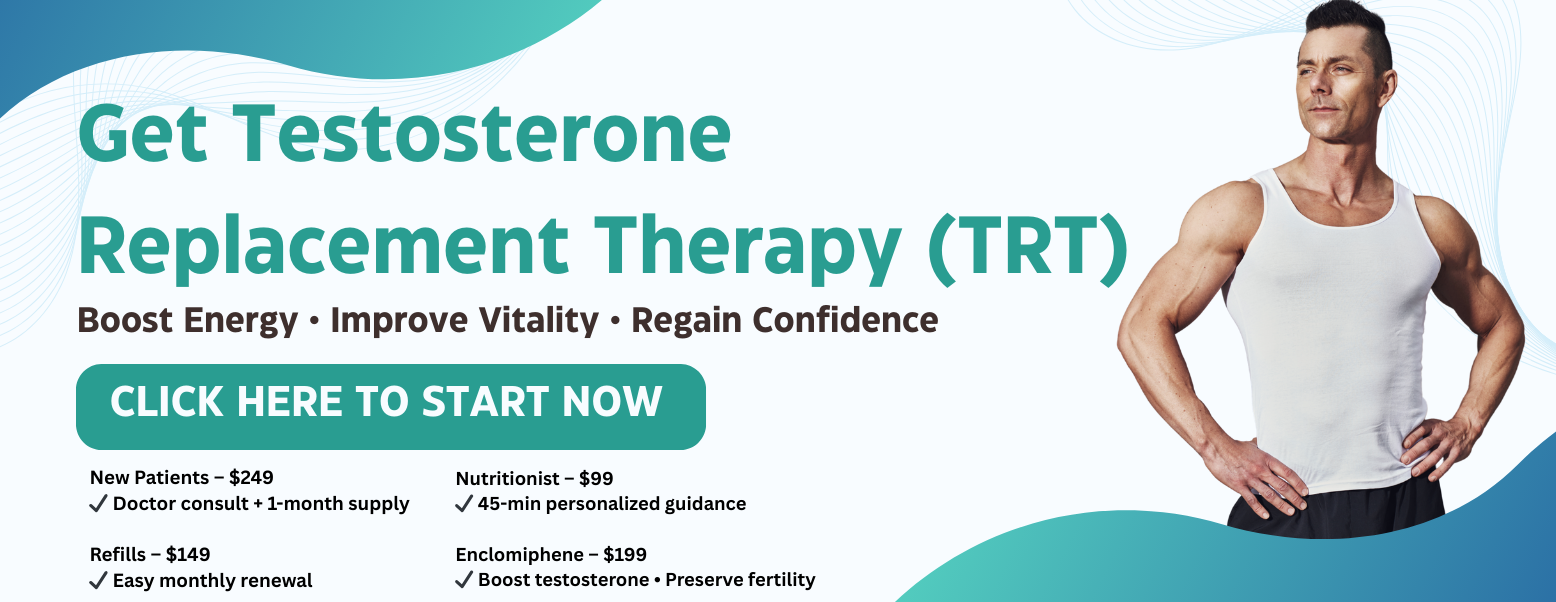Are you considering testosterone replacement therapy (TRT)? You may be envisioning more energy, increased strength and greater confidence. However, here is a question that may surprise you: is TRT slowly elevating your blood pressure?
TRT can be very beneficial for energy and muscular mass, but its influence on cardiovascular health—and blood pressure, in particular—is much more complicated. Some people may improve, others may aggravate, and it all depends on the person.
Don’t Wait, Reclaim Your Vitality – Click here to Book Your TRT Consultation Now!
It is of great importance to keep in mind that low testosterone, if left untreated, leads to serious consequences. Among these are abdominal fat, metabolic dysfunctions, type 2 diabetes, all of which may further precipitate heart disease. Studies have even shown that men with lower testosterone levels are more likely to die from cardiovascular causes than those with balanced or normal testosterone levels.
How might this hormone therapy affect blood pressure? Is it possible to have hormone therapy peacefully and wisely?
How Does Testosterone Affect Blood Pressure?
Nurtured by many mechanisms in the body, testosterone has a mixed relationship with blood pressure: some exerting blood pressure-lowering effects and some exerting blood pressure-raising effects. Your body's hormone metabolism and baseline health will determine the total response.
Blood Vessels
Testosterone has a very pro-vascular effect; it promotes healthy blood vessel behavior by allowing them to relax. When blood vessels relax, they expand, and lessened resistance from wider vessels may facilitate a natural drop in blood pressure.
The inverse thing that can happen is overstimulation of the renin-angiotensin-aldosterone system (RAAS: a system of hormones in the body that controls blood pressure and fluid volume). When RAAS is overstimulated, vasoconstriction occurs: blood vessels narrow, resistance becomes higher, and, hence, the blood pressure goes up.
Blood Thickness
Testosterone is naturally a stimulant for red blood cells to increase in number. Increasing red blood cell number helps to provide a larger supply of oxygen to muscles and organs, and is a good thing for any performance discussion.
Nevertheless, if there are more red blood cells being manufactured than utilized, there may be an increase in the viscosity of the blood due to the greater concentration of the red blood cells. Concentrated red blood cells equate to thick blood. Pumping blood through thin fluids is the heart's job; thicker blood may progressively raise blood pressure, increasing cardiovascular stress and leading to worse outcomes.
Fluid Retention
Your body may retain salt and fluids as a result of TRT. This new volume of blood will make the heart work harder, sometimes resulting in higher blood pressure.
Swelling in the hands, feet, or ankles nearing the mild to moderate side are possible early signs. Definitely watch for that as you move through therapy, especially at the beginning.
Possible Positive Effects
Research is mixed. Some studies show a slight increase in systolic pressure (the top number of BP), although there are still many studies demonstrating improved vascular function or no changes in blood pressure.
To impact your unique results:
- Age: Older men can potentially demonstrate a greater shift in blood pressure.
- Dose: The risks of higher doses of testosterone versus the risks of low-dose testosterone may be related to cardiovascular risk.
- Pre-existing condition: Men with high blood pressure or heart conditions may demonstrate exacerbated effects of TRT on blood pressure and *not in a good way.
Ways to Monitor Your Blood Pressure While You Are on TRT
Your body may retain salt and fluids as a result of TRT. This new volume of blood will make the heart work harder, sometimes resulting in higher blood pressure.
Swelling in the hands, feet, or ankles nearing the mild to moderate side are possible early signs. Definitely watch for that as you move through therapy, especially at the beginning.
Prepare for the Measurement
Checking your blood pressure correctly is one of the prime safety things you can do once you start on TRT. Together with your doctor, monitoring your blood pressure will give you some feedback about your health so as to make decisions.
To measure blood pressure effectively at home use the following steps:
- Preparation for the Blood Pressure Measure
- Do not drink caffeine, smoke, or exercise for 30 minutes before the test.
- Make sure your bladder is empty.
- Sit quietly for at least 5 minutes prior to “taking your blood pressure."
Position Yourself Correctly
- Sit with a straight back and support.
- Place both feet flat on the ground, and not crossing your legs.
- Because blood pressure is measured in the upper arm, your arm must be resting on a table level with your heart. The cuff goes around your bare upper arm, not over clothing or sweating arms.
Taking the Measurement
- Stay motionless and silent while the cuff inflates and deflates.
- Take two to three blood pressure readings, separated by around one minute.
- The best number is obtained by taking the average of those figures.
Record Your Readings
Record each blood pressure measure with:
- Date and time
- Which arm you used
- Any other special circumstance (stressed, exercised)
This will give you a very important log on how your body is responding to TRT.
Consequences of High Blood Pressure On TRT
Uncontrolled hypertension related to testosterone therapy can lead to serious health consequences, some of which could be life-threatening.
- Cardiovascular Complications
Hypertension is a significant risk factor for significant cardiovascular events, including:
- Heart attacks
- Stroke
- Hypertension-related heart disease
- Peripheral artery disease
TRT may increase these risk factors in people with existing cardiovascular issues and risk, especially if blood pressure is not monitored regularly.
- Increased Risk Of Blood Clots
Increased viscosity of blood related to testosterone can heighten the risk of thrombosis, i.e., clot formation in veins or arteries. Such clots disrupt normal blood flow and can, therefore, lead to complications such as:
- Deep vein thrombosis (DVT)
- Pulmonary embolism (PE)
In the presence of hypertension, the risk of clots occurring increases and is potentially dangerous.
- Organ Damage
Over time, chronic hypertension can damage internal organs. Your:
- Heart may thicken or weaken
- Kidneys may suffer from compromised blood-flow.
- The arteries may become stiff and narrow.
TRT-induced blood thickness and fluid retention can worsen these negative effects if they are uncontrolled.
How to Lower Blood Pressure While on TRT
Increasing blood pressure during TRT doesn't necessarily mean that therapy should be terminated-it may just be a call-to-action to do something about it. Let me share a few heart-healthy strategies that stay compatible with hormone therapy.
Maintain a Healthy Diet
Follow a healthy eating pattern that includes:
- Grain products, fruits, vegetables, and other whole grain-based foods
- Lean proteins (such as fish or legumes)
- Low sodium and low saturated fat
The DASH (Dietary Approaches to Stop Hypertension) dietary plan is a good model. Working with a registered dietitian could help develop a plan.
Monitor Your Blood Pressure Regularly
Using a home monitor, check your blood pressure every day or a few times a week, depending on your doctor’s recommendations. A trend, if recognized, will allow you to modify your lifestyle or treatment in a timely manner.
Avoid Excessive Alcohol Consumption
Infrequent wine with dinner is OK, but regular heavy drinking will increase your blood pressure. Follow your recommendations which state that women should not consume more than 1 drink a day and men 2 drinks a day.
Exercise Regularly
Try to find time to do at least:
- 100 - 150 minutes of aerobic activity (walking briskly or riding a bike) per week
- + 2 days of strength training!
Not only will this maintain testosterone levels, but it will also help to improve your heart health and reduce blood pressure.
Quit Smoking
In short, smoking causes your blood vessels to thin, which instantly elevates your blood pressure. Quitting smoking will significantly reduce your chances of heart attack, stroke, and high blood pressure - especially when you are on TRT.
Adopt Stress Management Techniques
High blood pressure is usually accompanied by chronic stress. It's essential to find stress management techniques that are effective for you; here are a few daily techniques that can help:
- Deep breathing
- Meditation or yoga
- Being outdoors, or taking digital detoxes
- You can lower your blood pressure and pulse rate by maintaining your composure.
Get Enough Sleep
Poor sleep is notorious for messing with hormone balance and controlling blood pressure level. Create a regular sleep regimen and aim for 7 to 9 hours of sleep per night.
Limit Caffeine Intake
While caffeine tends to increase alertness, excess levels can cause a temporary spike in blood pressure. If you are caffeine sensitive, make an effort to limit intake, and monitor how your body reacts.
Drink Plenty of Water
Staying hydrated helps maintain healthy blood flow, and allows the body to take care of regulating your blood pressure. Aim to drink at least eight glasses of water a day, while considering your physical activity and the weather.
Conclusion
There are so many things to gain from TRT — some of those things include: energy, more muscle, better cognitive clarity, more libido, and more. But, like all powerful therapies, comes responsibility. Foremost of those responsibilities is being alert concerning any changes in blood pressure.
Fortunately, by integrating some of the things discussed in this article regarding good and smart lifestyle choices and ongoing monitoring, along with your individual and customized care, you can safely take advantage of all the wonderful benefits that TRT has to offer you without sacrificing the health of your heart.
At The KIF, we are about far more than just hormones; we build a strategy around your health that will incorporate and support your long-term wellness.
Here is how we can help keep your TRT journey safe and simple:
Free consultation: $0
Talk to a hormone professional and get your questions answered without commitment.
TRT New Patient Plan: $249
A 1-month supply of medications to get started, plus a physician with a thorough consideration of your cardiovascular risk.
Monthly TRT Subscription: $149/month
This is a subscription service that offers expanded ongoing care, including telehealth visits, delivery of medications, and also tracking blood pressure and overall health.
Would you like to take charge of your health and hormones — safely?
Book your free consultation today and find out how the KIF can support you — with total confidence and care.
 Since 2021, Kif offers a streamlined platform to get a medical marijuana card online. We have served more than 45K patients across the United States. Sign Up Now to get the right to use medical cannabis for your health condition without any delay.
Since 2021, Kif offers a streamlined platform to get a medical marijuana card online. We have served more than 45K patients across the United States. Sign Up Now to get the right to use medical cannabis for your health condition without any delay.
























